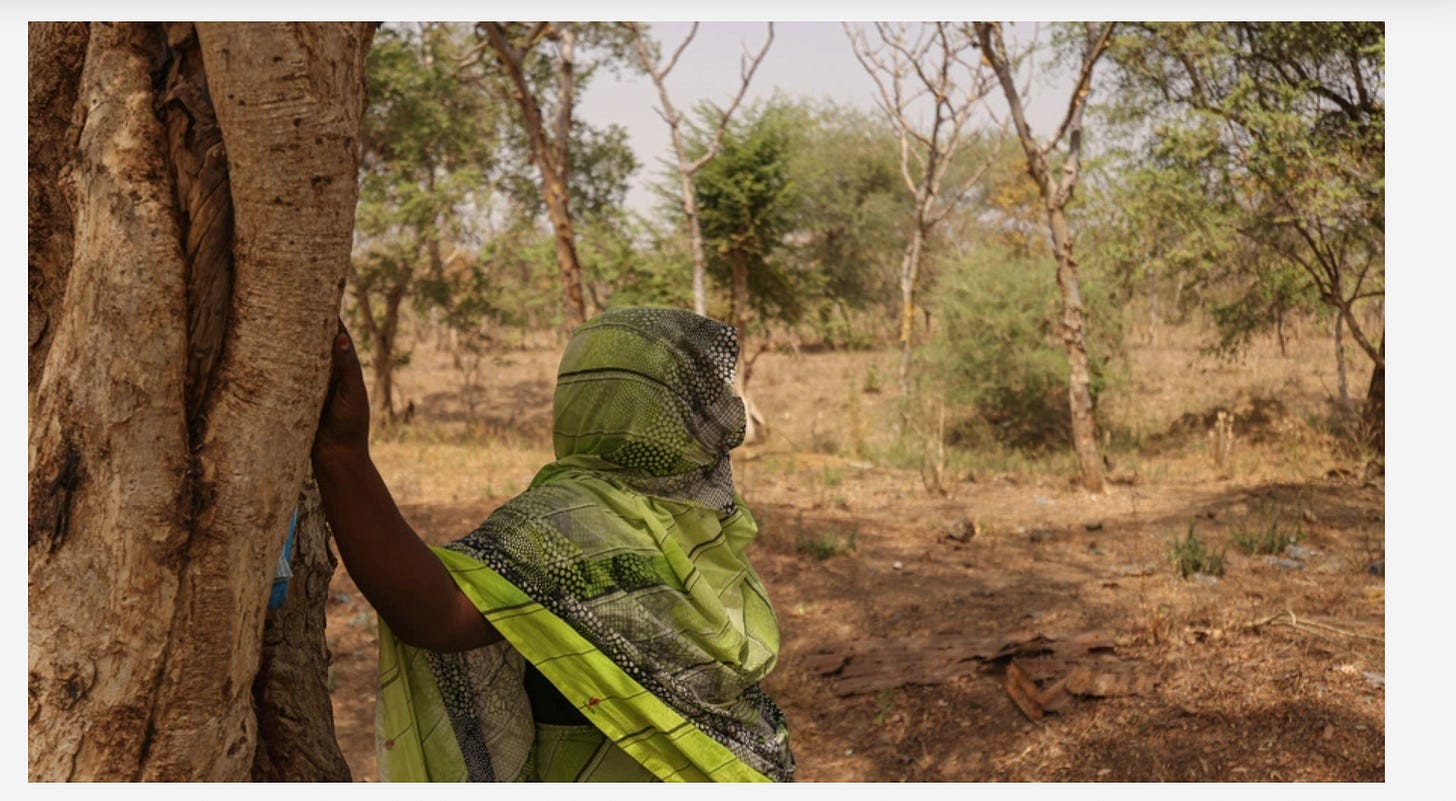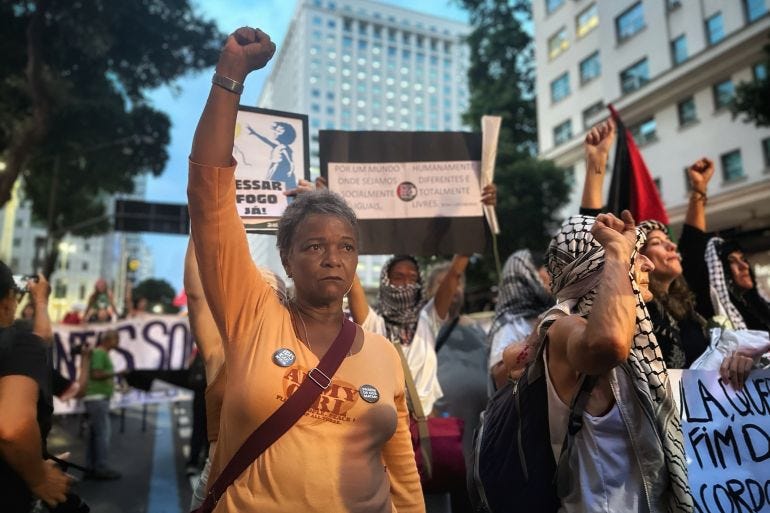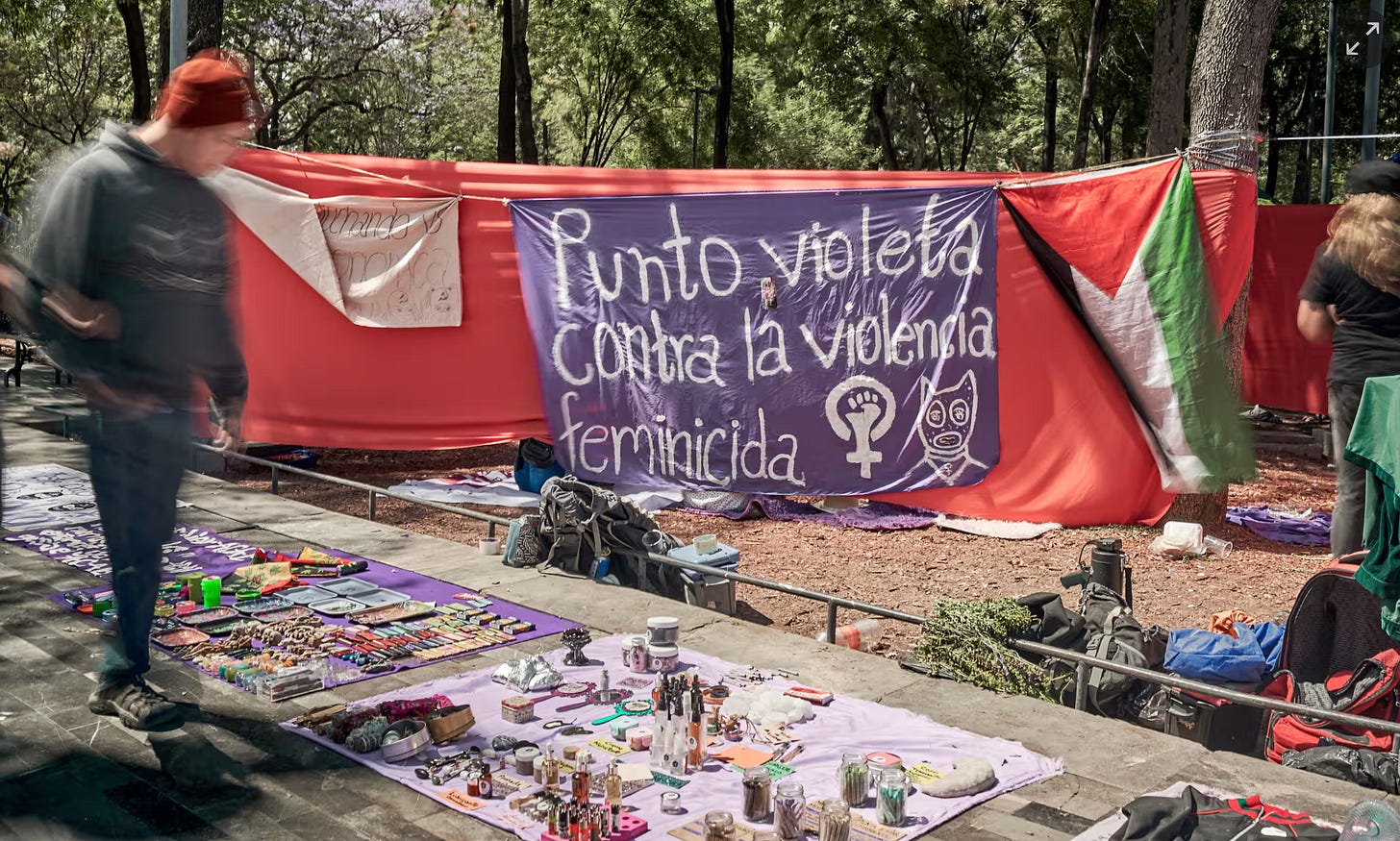Global Roundup: Sudan Conflict & GBV, Brazil Abortion Ban, Queer Ghanaian Film, Mexico City’s Feminist Markets, Young Queer Muslims Share Experiences
Curated by FG Contributor Samiha Hossain
Sudanese refugee and mother-of-five Fatima* stands near her family's shelter at a reception site near Ethiopia's border with Sudan. © UNHCR/Tiksa Negeri
CW: rape, sexual violence
When fighting first broke out in Sudan’s capital Khartoum, 39-year-old Fatima (not her real name) thought the safest option for her and her four children was to stay indoors as her husband and eldest son were missing – their whereabouts are still unknown. However, Fatima was raped several times by armed men who entered her home. She then moved her family out of Khartoum closer to the border with Ethiopia.
After two months of relative safety there, Fatima discovered that she was pregnant. Determined to leave Sudan and the conflict behind, she sold the last of her gold to pay for the family’s travel across the border to Ethiopia. She and her children are now living in a family shelter at a site on the Ethiopian side of the border, where UNHCR, the UN Refugee Agency, and its partners are helping the authorities to provide refugees with assistance and services.
Here there is no gunfire … we get water to drink and somewhere to sleep without [the threat of] rape. [But] I am pregnant, … I don’t know how long we are going to stay here without a house, without a door to close so you can feel safe. I need help. -Fatima
Salma (not her real name), 26, lived with her husband and three children in El Geneina, the capital of Sudan’s West Darfur region. The family’s house was burned down when conflict engulfed the city, leading them to set out for the border with Chad. On the way, Salma’s husband was seized by a group of armed men. A short while later, four more armed men stopped the group and assaulted Salma while she was unconscious. Salma and one of her children were beaten by another man wielding a club on the Sudanese side of the border, who stole Salma’s money and belongings.
The family are now living in eastern Chad, where Salma registered with UNHCR and received food assistance and medical attention. But despite the help she has received, her situation remains bleak. She earns a little money doing odd jobs for her neighbours to help keep her children fed, but she still suffers from pain in her back and abdomen following her attack.
I have to work despite the pain; otherwise, who will feed my children? Our children should be in school for their future. I just want my children to go to school and be safe. -Salma
The scale of the emergency and the lack of available funding is hampering UNHCR’s response, according to UNHCR’s Gender-Based Violence Officer for eastern Chad, Nadine Sekaganda Mutunzi. She added that they are only able to provide the “strict minimum” and are unable to provide survivors with a holistic response.
Thousands marched for abortion rights in Brazil last month {Gabriela Barzallo/Al Jazeera]
In 2019, Mariana Leal de Souza, a 39-year-old Black woman living outside Brazil’s largest city, Sao Paulo, was having a hard time coping with the suicide of her teenage son when she learned she was pregnant. She couldn’t get the abortion she wanted because Brazil’s Penal Code permits abortion only if the pregnancy is the result of rape, puts the mother’s health at risk or doctors diagnose severe malformations to the fetus.
With the help of three close friends, Leal de Souza was able to get Cytotec from an underground supplier – a medication originally intended for ulcers but repurposed by low-income women in Latin America as a means to terminate unwanted pregnancies. But the experience was agonizing which she initially assumed were standard complications.
Two months later, Leal de Souza decided to seek assistance at a nearby public hospital where she endured prolonged wait times and a barrage of inquiries before medical staff finally examined her. Doctors discovered that a fetus remained inside her womb as she had been carrying twins, and only one fetus had been expelled. The hospital concluded that this was the result of a miscarriage, sparing de Souza from criminal charges.
I felt a sense of relief, yet simmering resentment lingered, knowing that if I were … white or [a] woman of means, I could have accessed safe clinical care without endangering my life. -Mariana Leal de Souza
Women who undergo illegal abortions face prison sentences of up to three years if convicted, and the doctors who perform them can spend up to four years in prison. However, Black and marginalized women bear the brunt of legislation that criminalizes abortion. A study conducted by anthropologist Debora Diniz found Black women are 46 percent more likely than white women to resort to unsafe abortion practices.
The women’s movement in Brazil is growing, but it has encountered pushback from the evangelical movement in its efforts to improve reproductive health for women. The proliferation of evangelicals in Brazil has helped discourage low-income women like Leal de Souza from seeking abortions. They also hold significant leverage in Congress.
We used to have open dialogues within my family and neighbours who are now evangelicals. Nowadays, dissent is met with condemnation. This silence prevented me from sharing my decision to terminate my pregnancy. -Mariana Leal de Souza
A poster for Nyame Mma. Photograph: Samuel Blankson
Joewackle J Kusi was finishing his film Nyame Mma (Children of God) when an anti-LGBTQ+ bill was passed in Ghana, bringing the threat of prosecution for those ‘promoting’ queer stories. According to the bill approved in late February, those involved in the “wilful promotion, sponsorship or support of LGBTQ+ activities'' will face jail sentences of up to five years. The legislation, awaiting presidential endorsement before it becomes law, also stipulates a prison sentence of between six months and three years for those found guilty of identifying as LGBTQ+.
Kusi says the bill’s passing forced him to cut the schedule short, to just one private screening for prominent art and film figures. It was shown on 6 March, Ghana’s independence day, at a venue in Accra, but Kusi has no idea if it will ever reach a wider audience.
I was nervous, I was anxious because of the bill. The safety of my cast and crew kept me up at night. We considered that it was safer to just have one night. We didn’t go big because it didn’t feel safe to screen a film with a queer character in Ghana around the time this bill was passed. -Joewackle J Kusi
Nyame Mma tells the story of a 30-year-old queer man who moves away from home to live in Bolgatanga, a town in northern Ghana, because of family friction over his sexuality. After the sudden death of his father, he returns home to Sekondi, in the country’s south-west. There, he meets his estranged lover who, under intense societal pressures, is about to marry a woman. He is left grieving not just for his father, but also the loss of his lover.
Based in Accra, Kusi, 31, studied broadcast journalism and mass communications at the Ghana Institute of Journalism. He worked as a writer and producer at a local television network before losing his job during the pandemic which led him to focus on film-making.
Growing up, every single time I have seen a queer representation in a Ghanian film it’s been in negative light. You’ll see them at the end of the film giving their life to Christ, or they’re probably on the bed dying from some STDs. I felt that shouldn’t be the only real representation, so I tried to create positive characters. -Joewackle J Kusi
Human rights groups have been urging the president, Nana Akufo-Addo, not to sign the bill into law. But Kusi points out it is election year in Ghana, and the season for populist policies.
The only thing that unites Ghanians, no matter what political party, or religion, is homophobia. Homophobia makes it really hard for people to think clearly. It obstructs your reasoning. -Joewackle J Kusi
In Alameda Central park women from feminist collectives set out stalls selling merchandise including toiletries, crafts and clothes
As the sun rises in Mexico City, Marchigua sets off on her 45-minute cycle ride from the fringes of the city to Alameda Central park. There, the 37-year-old campaigner joins a lively group arranging blankets on the pavement and putting up banners, all bearing messages in support of women’s rights. Women wear scarves in green and purple – the colours of Latin America’s equality movement. This mercadita feminista, or feminist market, is one of several around the city – and about more than commerce. The stalls are also a protest against Mexico’s persistent gender inequality.
On weekdays, Marchigua prints stickers and posters with slogans, which she sells or exchanges with fellow traders. She chose to work at the market after being exhausted by the discrimination and abuse she experienced in the workplace over her sexuality. She now calls herself a full-time activist.
Part of our philosophy is to underscore the act of seizing public spaces as women and gender dissidents – a political stance. It’s about showcasing our capacity to sustain ourselves and generate our own resources. -Marchigua
The Mercaditas Feministas began as a Facebook group where women sold and exchanged food and other products. During the Covid pandemic, the increase in femicides and violence against women, as well as record numbers of layoffs in Mexico, prompted the group to grow as a support network. As restrictions eased, women launched their markets in Alameda Central park, Colonia Roma and Plaza de los Insurgentes. The Human Rights Commission of Mexico City (CDHCM) says about 600 people are involved.
Nelly López, 64, is a grandmother who not only sells goods but provides psychological and legal assistance, especially for survivors of violence. López believes in the importance of developing economic opportunities for women in her country.
The state has failed us so we only have each other. If we don’t save ourselves, no one saves us. -Nelly López
The mercaditas are unlicensed and occasionally harassed by police and other street vendors, but have earned local recognition, with the city’s rights commission issuing a report endorsing their transformative effect on the capital. For the stallholders, the true impact of their efforts lies in the network they have built.
Photo: Abraham Gonzalez Fernandez/Getty Images
Dena Igusti said being a queer Muslim is about “friendships and family and love.” For Ramie Ahmed, it's about autonomy, and being empowered to be yourself. Armana Kahn said being a queer Muslim is all about looking beneath the surface.
[It's] about digging for a deeper answer than just what's presented to you. Not really believing everything that's said in black and white, but really doing a lot of introspective research. - Armana Kahn
Sophia Uppal is one of many queer Muslims who find that their identity isn't at odds with their faith, but rather deepens their understanding of it. For Uppal, their identity fits with their faith like a puzzle piece. Queer Muslims have built community in the U.S. Affirming spaces like Masjid Al-Rabia, where marginalized Muslims are centered, offer a space to worship and to find like-minded people. It's this kind of community that Uppal rejoices in.
Being a queer Muslim is life-giving, it's community building. It's just love. It makes me love myself more and my religion more. -Sophia Uppal
Samiha Hossain (she/her) is an aspiring urban planner studying at Toronto Metropolitan University. Throughout the years, she has worked in nonprofits with survivors of sexual violence and youth. Samiha firmly believes in the power of connecting with people and listening to their stories to create solidarity and heal as a community. She loves learning about the diverse forms of feminist resistance around the world.






